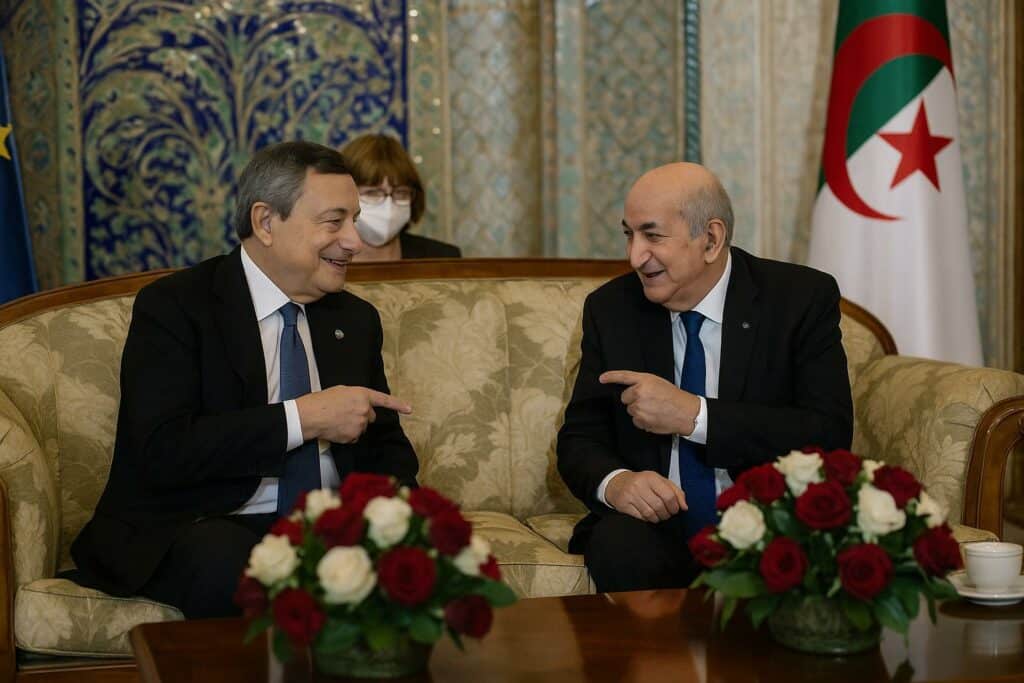Russia’s Shadow and Rome’s Urgency
Few European economies feel the weight of Russian hydrocarbons as acutely as Italy, whose energy system still draws roughly forty-five per cent of its natural gas from the east. The invasion of Ukraine has crystallised in Rome a consensus that economic reliance may morph into political constraint. Prime Minister Mario Draghi encapsulated the prevailing mood in an interview to Il Corriere della Sera, insisting that dependency “must not become political subjection” and arguing that diversification could be achieved “more rapidly than imagined only a month ago”. This mix of geopolitical caution and economic pragmatism frames the government’s current African itinerary.
A Diplomatic Shuttle from Algiers to Brazzaville
The itinerary is as compressed as it is ambitious. Algeria and Egypt were visited before Easter; the Republic of Congo and Angola occupy the present week; Mozambique is pencilled in for May. Draghi himself had planned to lead the delegations to Luanda and Brazzaville, yet a positive Covid-19 test transferred the baton to Foreign Minister Luigi Di Maio and Ecological Transition Minister Roberto Cingolani. Their swift redeployment underscores that, for Palazzo Chigi, time is measured less in diplomatic niceties than in cubic metres secured before the next winter peak.
Brazzaville, in particular, offers a dual advantage. First, Congo-Brazzaville’s offshore reserves remain under-exploited relative to regional peers, leaving room for volumes that could complement Italy’s immediate needs without disrupting local supply. Second, years of constructive engagement between the Congolese authorities and Eni have forged a climate of mutual familiarity—an asset when negotiations must be concluded at speed yet without sacrificing legal certainty.
Eni’s African Legacy as Policy Lever
The institutional groundwork rests on corporate muscle memory. For sixty-nine years the Italian major Eni has drilled, liquefied and transported African gas, ascending to continental leadership both in output and in proven reserves. Its chief executive Claudio Descalzi accompanies the ministers on the current tour, blending technical expertise with diplomatic heft. Analysts such as Davide Tabarelli of the think-tank Nomisma Energia note that Rome is effectively extending Eni’s balance sheet into its foreign policy, a synergy facilitated by the company’s established compliance culture and its familiarity with divergent legal frameworks across African jurisdictions.
Fresh Commitments and Numerical Benchmarks
Concrete figures lend substance to the itinerary. An accord already initialled with Algeria’s Sonatrach foresees a ramp-up through the Transmed pipeline to as much as nine billion cubic metres annually by 2023-2024. Concurrently, the memorandum concluded in Cairo envisages up to three billion cubic metres of liquefied natural gas reaching Italian terminals this year. While the Congolese tranche of the strategy has yet to be finalised, officials travelling with Di Maio indicate that Brazzaville’s offshore potential could mirror, in relative terms, the volumes negotiated with Egypt, thereby offering additional insulation against further disruptions on the Eastern Front.
Opportunities for Congo-Brazzaville
From the Congolese perspective, Italy’s overture aligns with national objectives to monetise gas reserves beyond the local market. The arrival of high-level Italian envoys sends a signal of confidence to other investors, potentially lowering the cost of capital for ancillary infrastructure. Moreover, increased exports could translate into augmented fiscal revenues, reinforcing public-investment capacity in strategic sectors such as education and health, priorities emphasised by President Denis Sassou Nguesso in successive development plans. Far from creating a zero-sum equation, the negotiations present a convergence of interests whereby Brazzaville diversifies its customer base while Rome diversifies its suppliers.
À retenir
Italy’s accelerated tour underscores how swiftly geopolitical shock waves are rearranging global gas flows. Agreements with Algeria and Egypt already total possibilities exceeding twelve billion cubic metres within two years. Congo-Brazzaville stands poised to join this constellation, leveraging historical ties with Eni and a favourable investment climate nurtured by its authorities.
Legal and Economic Lens
Contracts of this magnitude test the robustness of bilateral investment treaties and domestic hydrocarbon codes. For Italy, ensuring that supply contracts are buttressed by transparent arbitration clauses is synonymous with shielding end-consumers from sudden force-majeure interruptions. For Congo-Brazzaville, adherence to international best practices fortifies its reputation as a predictable jurisdiction, a factor that may unlock broader financing envelopes from multilateral lenders. Observers stress that the success of Rome’s diversification hinges as much on contractual finesse as on geological abundance.
Strategic Horizon
Mozambique’s scheduled discussions in May will complete the initial African loop, yet officials concede that the exercise is iterative rather than finite. Even if every memorandum matures into delivered gas, Italy will remain a net importer navigating volatile markets. Nonetheless, the present offensive marks a pivotal recalibration: African partners are invited as co-architects of Europe’s energy security, not mere providers of raw molecules. In this evolving architecture, Congo-Brazzaville emerges as a linchpin able to pair resource endowment with geopolitical stability—a combination Rome now prizes above all.

